You’ve probably asked yourself the age-old question “is this still good?” while rummaging through your fridge and freezer. Spoiled food can put a damper on any dinner plan. It’s easy to forget what the contents of your fridge and pantry are. Life moves fast, and you have to stay on top of your grocery game to manage food waste.
By knowing how to properly store food, you’ll find increased longevity of your dishes and save yourself yet another run to the grocery store. This guide lists top-of-the-line gadgets to store food so you can say so long to spoiled food!
Airtight Containers to Store Food
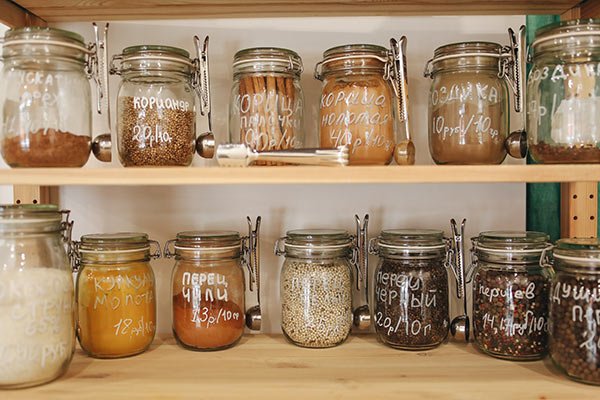
While attempting proper food storage, it’s essential to purchase the correct container for the items you’re storing. When you simply add a chip clip, or worse – just fold your bag over itself, you’re on your way to air seeping through your ingredients.
In extreme cases, you’ll start to find little bugs throughout your food. Find airtight pieces like the OXO Good Grips, to keep away unwanted moisture and air from your dry goods. This price-sensitive set is the perfect addition to any pantry. Stackable and easy to organize, these are any cook’s dream for dry goods.
Similarly, if you’re cutting back on plastic, the Oggi Acrylic Canisters are the perfect alternative. These acrylic containers are ideal for kitchen staples and are design-friendly to keep directly on your counter without being an eyesore. The handy spoon connectors allow for easy access to your goods without getting hands and germs throughout your container.
Freezer Storage Bags to Prevent Spoiled Food
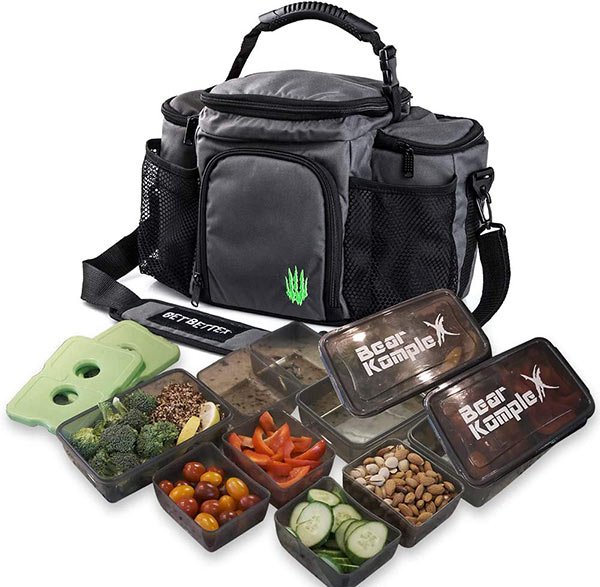
Freezer bags are essential to food storage. Because the longevity of food is significantly greater in the freezer, you’ll want to keep these bags on hand at all times.
Regular storage bags typically have a similar type of seal, but the thickness is notably less effective. When you store your food in a regular Ziploc in lieu of a freezer bag, you risk freezer burn and air leaching into your food.
The Attne Reusable Bags are a fantastic durable option. The varying size comes to making it easy to store anything from chicken to veg. Additionally, these leak-proof bags with a 100% satisfaction guarantee, so you can return with confidence.
Home Hero makes quality silicone food bags that are safe for freezer storage. With these bags, you can store up to 50.7 ounces, perfect for a big family that meal preps. Additionally, these handy bags come in 1-7 packs for those bulk buys. These non-toxic storage units include a bonus holder and a sponge ideal for cleaning up after storage.
Vacuum Sealers to Store Food
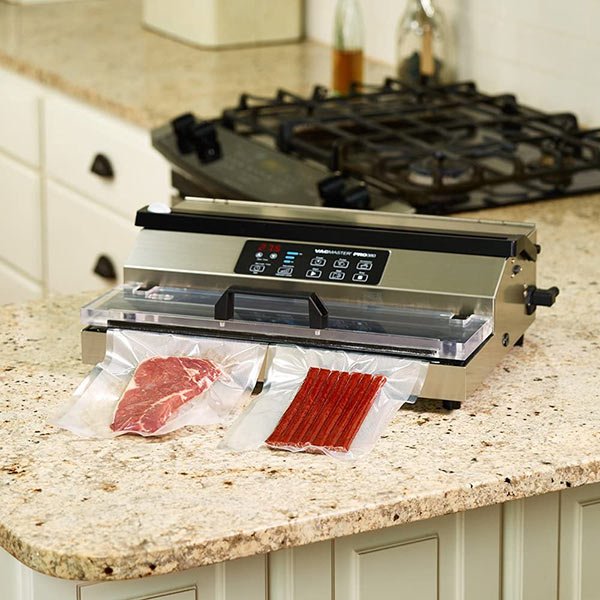
Vacuum sealing food is perhaps one of the best ways to store your dry and wet goods in the freezer, pantry, and fridge. In the midst of the health crisis, families need to be vigilant about bacteria that can move from the store to the home. Vacuum sealing is the safest way to protect your food against bacteria teeming on the surface.
These time-saving gadgets allow you to purchase food in bulk and divide your goods into individual portions, saving you time and money in the process. The VacMaster is restaurant grade and top of the line. Spoiled food doesn’t stand a chance next to this reliable kitchen tool.
For the price-conscious buyers, the EIVOTOR Sous Vide vacuum will do the trick. This vacuum is a multifunctional budget-friendly option. You’ll notice better tasting food that lasts longer for easy meal prep.
Bonus points – this piece has an LED indicator light for hands-free operation and comes with a starter kit of fifteen bags so you can get started storing as soon as you get the product.
Don’t forget the necessary accessories for your new favorite kitchen tool. You’ll need things like chamber sealer bags, and maybe even a paired Vacu Vin Wine Saver – we’ll cheers you virtually.
Vegetable Wash to Prevent Spoiled Food
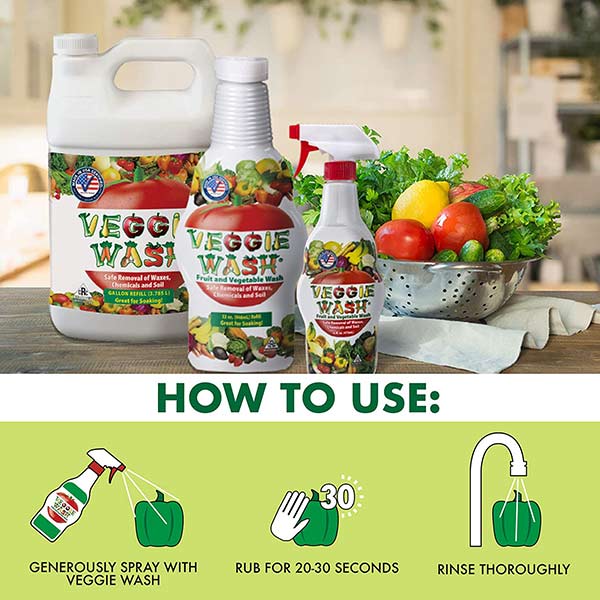
We all know that washing fruit and veg is essential before consumption, but even better than warm water? Veggie wash! This liquid savior will fight any residue from the farm to the store before consuming your meal. USDA-certified organic, and gentle enough for even fragile fruits and veggies, this is a crowd favorite for kid-centric homes.
After washing, make sure you dry your product completely before storing to avoid spoiled food from moisture. When storing your fruits and vegetables, make sure to keep veggies at the bottom where it’s coldest.
Food Labels for an Organized Kitchen
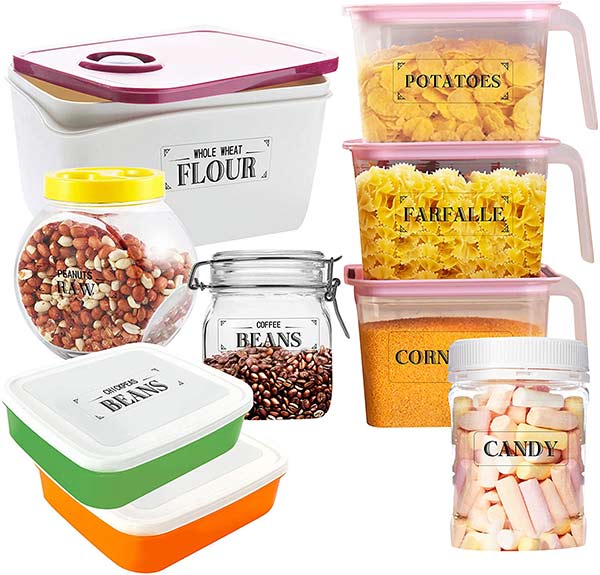
One challenge of moving contents from their original packaging is keeping organized. You’ve likely bought your set of containers, and vacuum-sealed up a storm, but now everything’s looking similar in your pantry and fridge. The best way to combat this organizational challenge is with food labels.
Our favorite pick is highly customizable, dissolvable food labels. The roll features 500 labels so you won’t run out anytime soon. Additionally, you can fill out personalized information like the item, date and time, and use-by dates. For a simpler solution, the clear pantry labels by Hebayy are a go-to. Not only are they sleek, but the design is perfectly modern with its farmhouse aesthetic.
Tips to Store Food
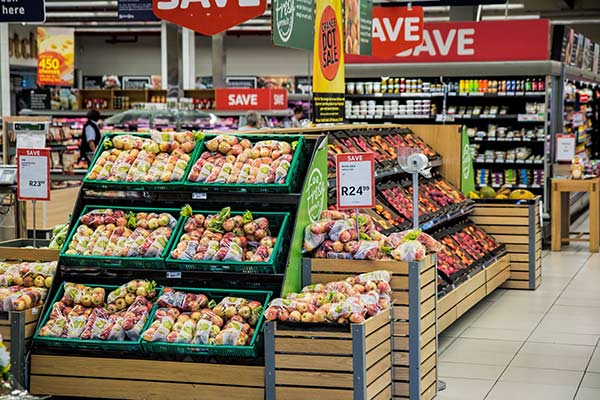
It’s important to store food properly to avoid potential food poisoning. Make sure your fridge and freezer are the correct temperatures for the food you’re storing. Typically, you should aim to refrigerate food at 38-40 degrees fahrenheit. Additionally, like the crisper drawers in your fridge with paper towels. Doing this will soak up any additional moisture that may have creeped in.
Some simple rules of thumb are:
- Dairy: Store your yogurt, milk, and dairy products in the back of the refrigerator. This tends to keep these essentials colder, and away from the constant opening and closing of the door.
- Meat: Store meat on the bottom shelf. Similar to dairy storage, the bottom of the fridge tends to be the coldest part of your appliance to keep your meat fresher, longer.
- Leafy Greens: Store your leafy screens with the stems in a glass of water. Cover the top of the veg with a plastic bag loosely wrapped to increase storage length.
- Herbs: When storing herbs, be sure to dry them out completely. Any residual moisture will cause the herb to wilt faster. Herbs should be treated gently and trimmed before storage.
- Bananas: Cover the stem of your bananas in plastic wrap. Doing this increases the longevity of these fruits and prevents them from ripening too quickly.
- Grains: Grains need to be kept in airtight containers at all times. If you’re buying grains in bulk, consider freezing the majority of them, and only keeping what you’ll eat in the next few weeks on hand for maximum freshness.
- Berries: If you have leftover berries that will go bad before you’re able to eat them, soak them in three-part water, one-part vinegar solution. This prevents mold from forming and kills bacteria.
- Leftovers: Store your leftovers as quickly as you can after they’ve been cooked. Typically, you’ll need to store these within two hours of preparation, according to the CDC.
- Mushrooms: Wrap this fungi in paper towels before refrigerating. This will soak up additional moisture and prevent that unappealing slimy texture from forming.
- Flour: If you didn’t seal your flour in an airtight container, it’s possible that bugs crawled in. By putting the flour in the freezer for 48 hours, you can kill the insects present.
Preventing spoiled food can reduce food waste, and save you money in the long term. The first step is proper storage. From there you’ll need to keep a timetable handy to understand how long your kitchen staples will last.
By understanding how long your produce and meat will stay fresh, you’ll be able to keep food poisoning at bay and enjoy your food in a first in, first-out sequence.

